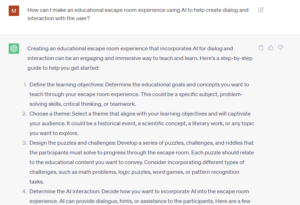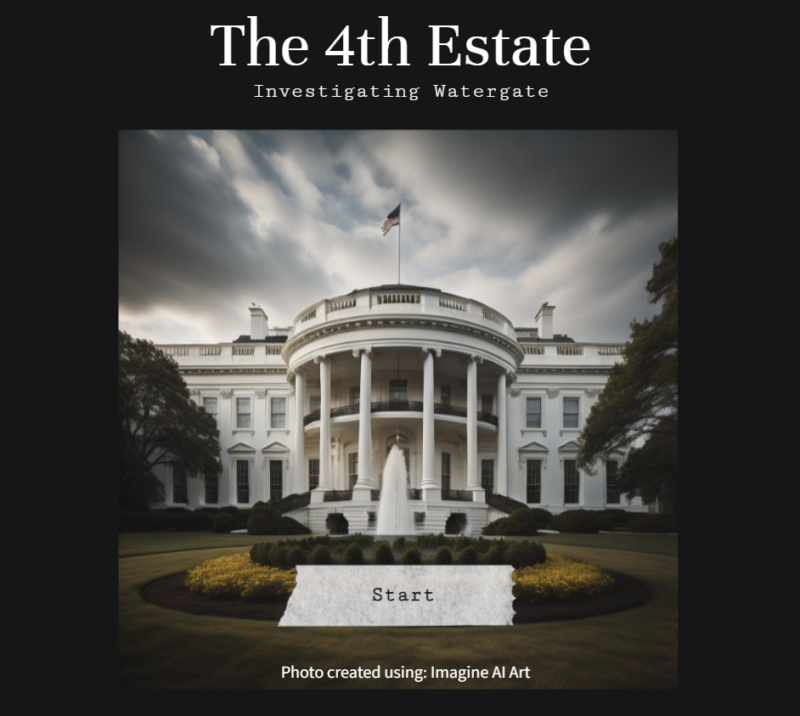Editor’s note: This story is part of a series of articles produced by students taking NYU’s Media Law and Ethics class with a focus on generative artificial intelligence. Students were challenged to come up with novel uses for AI to advance the field of journalism.
The Pitch (written by ChatGPT)
We are in the age of digital innovation. Technology now shapes almost every facet of our lives, leaving educators and creators to discover new ways to communicate knowledge and captivate learners. One such innovative application has emerged at the crossroads of artificial intelligence and journalism education—The 4th Estate. This virtual escape room delves into the early reporting of Bob Woodward and Carl Bernstein as they investigate the Watergate scandal. The immersive experience leverages AI to engage learners, teaching them vital historical lessons and journalism skills in an interactive and gamified environment.
The beauty of this AI-driven escape room lies in its potential for education. Designed primarily for journalism schools, this innovative teaching tool enables educators to immerse students in the world of investigative journalism. Participants hone their critical thinking and analytical skills by piecing together information, just as Woodward and Bernstein did during their groundbreaking reporting. AI-generated scenarios and challenges foster a sense of agency, transforming learners into active participants in historical events.
This concept also extends beyond journalism education. The gamified approach can be adopted across disciplines to teach critical evaluation of information and source reliability. For instance, AI-powered escape rooms could serve to train individuals in media literacy, equipping them with the skills needed to discern fact from fiction in today’s information-rich landscape.
AI isn’t merely a futuristic concept—it’s a gateway to innovation. The AI-powered Watergate escape room showcases the harmonious synergy between AI technology and journalistic education. Through immersive experiences, students and learners are transported to pivotal moments in history, forging a deeper connection with the past and honing essential skills for the future. As we navigate the ever-evolving landscape of education, this pioneering endeavor stands as a testament to the transformative power of AI.
Click here for The 4th Estate Virtual Escape Room (a desktop computer is recommended for the best user experience)
The reality of my experience (written by me)
I’m a self-described technology “noob”—a term my amused 6-year-old explained means “newbie.” Until this summer, I lived blissfully in my world of ignorance, especially when it came to the realm of artificial intelligence. I happily ignored the rumblings and controversy surrounding programs like ChatGPT, convinced I would never find a use for them. Hell, I felt quite advanced whenever I played around with Snapchat filters.
So, you can imagine my inner panic when we were tasked with creating a project that incorporated AI—specifically leveraging ChatGPT’s capabilities. Even signing up made me nervous. Was I breaking journalistic ethics? What questions do I ask? How do I get it to do what I want? Would it be smarter than me? Outshine my writing skills?
Coming up with something that was doable was my first hurdle. I wasn’t a gamer, but I loved anything gamified. I also liked challenges and hoped to create a virtual escape room infused with AI elements. My envisioned creation would serve as a resource for educators and could assist journalism outlets in informing readers. ChatGPT to the rescue! Asking for ideas on how to create an escape room simulation resulted in a list of ideas—spit out in mere seconds.

Conversation with ChatGPT [Credit: Molly Cotner]
There were roadblocks too.
Feeling brave, I sought to venture beyond AI chatbots and include AI-generated art and voices. Figuring out how to do this was often a challenge. My linguistic knowledge and software skills fell short of my coding prowess. I needed to rely on the existing tech landscape. A quick search shows a plethora of available programs, yet sifting through to find no-cost or reasonably priced options that were user-friendly was daunting. AI art frequently resulted in disturbing creations that paralleled unsettling or monotone AI voices. I was never able to use the first thing that popped up.
ChatGPT and Bard also had limitations. Conversations were frequently littered with inaccuracies, exaggerations, and no sources. Bard conjured up directions for integration into my escape room program, even though the ability to do so was not possible.
I could go on about the pros and cons of my experimentation, but better and more accurate reviews already exist. The debate concerning AI-generated content rages incessantly, dominating conversations spanning newsrooms to classrooms. On one front, AI embodies the future—opening doors to places only dreamt about. Conversely, it’s viewed as a harbinger of societal decay, threatening what we know and are comfortable with.
In my novice experience, AI was just a tool—a collaborator. It provided a platform for brainstorming, crafting art, and creating voices that surpassed my human talents. But it didn’t manifest as a magical genie that fulfilled my every wish at the click of a button. It required substantial human labor and input to make something usable.
What this journey did impart, is that embracing technology dispels its mystique. Existing in blissful arrogance only constrained my own capabilities. To some, this virtual escape room might be trivial. To me, it represents my ability to expand beyond the noob—or at least level up.
Click here for The 4th Estate Virtual Escape Room (a desktop computer is recommended for the best user experience)






